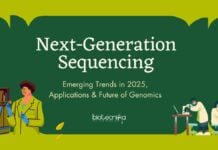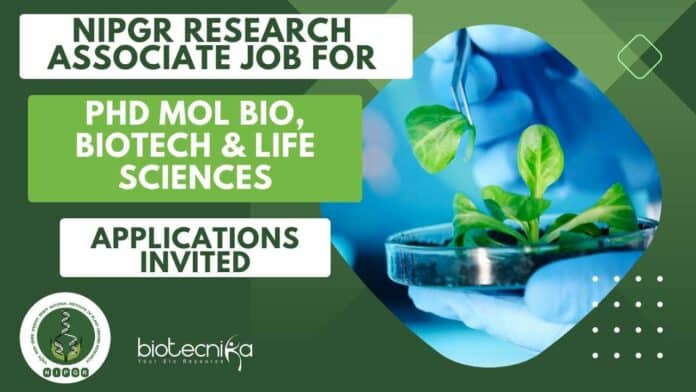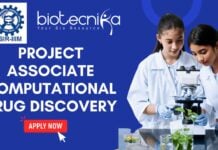NIPGR Research Associate Job For PhD Mol Bio, Biotech & Life Sciences – Applications Invited
NIPGR Research Associate Job For PhD Mol Bio, Biotech & Life Sciences – Applications Invited. PhD jobs at NIPGR. Interested and eligible applicants can check out all of the details on the same below
Applications are invited from suitable candidates for filling up purely temporary position of one Research Associate-III in the DBT Multi-institutional project entitled “Characterization of chickpea germplasm resource to accelerate genomics-assisted crop improvement”, under mission programme of “Characterization of genetic resources” under the supervision of Dr. Swarup Kumar Parida, Scientist, NIPGR.
Research Associate-III (One post): Emoluments as per DST/DBT norms & as sanctioned in the project.
Position: Research Associate-III
No of post: 1
Project title: Characterization of chickpea germplasm resource to accelerate genomics-assisted crop improvement
How to Apply:
The above position is completely on a temporary basis and co-terminus with the project. The fellowship amount for the above position is as sanctioned in the project. The initial appointment will be for one year or till the tenability of the project whichever is earlier and the same can be curtailed/extended on the basis of assessment of the candidate’s performance and discretion of the
Competent Authority. NIPGR reserves the right to select the candidate for the above post depending upon the qualification and experience of the candidate. Reservation of posts shall be as per Govt. of India norms. The appointment may be terminated any time by giving one month notice by either side. The applicants will have no claim implicit or explicit for consideration against any regular position of NIPGR.Eligible candidates may apply by sending a soft copy through e-mail in the given format with a cover letter showing interest The soft copy of the self-attested copies of the mark sheets, certificates, (10th standard onwards) and proof of research experience/publications should be attached with the application. A single pdf file, consisting of the application from the cover letter, and all documents, must be sent to [email protected] within 15 days from the date of advertisement. Canvassing in any form or bringing influence, political or otherwise, will lead to the disqualification of the candidate(s). A web link with the date and time of the online interview will be e-mailed to the shortlisted candidates only. The candidates must ascertain their eligibility before applying, as ineligible candidates will not be interviewed.
Note: ONLY soft copy of the application in the given format will be accepted. No TA/DA will be paid for attending online interview. For any clarification candidates may contact Scientist in charge through e-mail only.
Dr. Swarup K. Parida
Scientist-V
National Institute of Plant Genome Research (NIPGR)
Aruna Asaf Ali Marg, P.O. Box No. 10531
New Delhi – 110067
Email: [email protected].
Qualification: Candidates having Ph.D. degree in Life Sciences/ Biotechnology/ Molecular Biology or related field are eligible to apply. Candidates having M.Tech in Biotechnology/Bioinformatics with three years research experience and with atleast two first author research publications can also apply as mentioned in DST office memorandum number SR/S9/Z-08/2018 dated January 30, 2019. Candidates having research experience in the area of molecular biology, bioinformatics, functional genomics, genomics-assisted breeding duly supported with relevant publications will be preferred.
Download the application format
Check the notification below
Here are some interview questions and answers for the Research Associate-III position at NIPGR
1. Can you provide an overview of your research experience in molecular biology and genomics? Answer: Throughout my academic and professional journey, I have been actively involved in research projects focused on molecular biology and genomics. I have conducted experiments involving DNA extraction, PCR, cloning, gene expression analysis, and next-generation sequencing techniques. I am familiar with various molecular biology techniques and have a solid understanding of genomics concepts and methodologies.
2. How have you utilized bioinformatics in your research work? Can you provide an example? Answer: Bioinformatics has been an integral part of my research work. I have used bioinformatics tools and databases to analyze genomic and transcriptomic data, perform sequence alignments, identify genetic variations, predict protein structures, and conduct functional annotation. For example, in a previous project, I utilized bioinformatics tools to analyze RNA-seq data and identify differentially expressed genes in response to abiotic stress in a crop species.
3. Can you describe your experience in functional genomics and its application in crop improvement? Answer: In my research experience, I have focused on functional genomics to understand gene function and regulation in relation to crop improvement. I have conducted functional characterization studies, such as gene knockdown or overexpression experiments, to investigate gene involvement in specific traits or pathways. This knowledge contributes to the development of targeted breeding strategies and the identification of potential molecular markers for crop improvement.
4. How do you stay updated with the latest developments and advancements in genomics-assisted breeding? Answer: Staying updated with the latest developments in genomics-assisted breeding is essential to ensure the implementation of cutting-edge techniques and methodologies. I regularly read scientific journals, attend conferences, and participate in workshops and webinars related to plant genomics and breeding. I also actively engage in online forums and collaborate with researchers in the field to exchange knowledge and stay informed about recent advancements.
5. Can you discuss your experience in publishing research papers? Have you been a first author on any publications? Answer: I have actively contributed to scientific publications throughout my research career. I have co-authored several research papers in reputable journals, highlighting my involvement in various research projects. I have also had the opportunity to be the first author on two research papers, where I played a significant role in experimental design, data analysis, and manuscript preparation. These experiences have honed my scientific writing and communication skills.
6. How do you approach collaborative research projects? Can you provide an example of a successful collaboration? Answer: Collaborative research projects require effective communication, coordination, and teamwork. I believe in establishing clear objectives, defining roles and responsibilities, and maintaining regular communication channels with all collaborators. An example of a successful collaboration was a project where I collaborated with researchers from different institutions to analyze genomic data of a specific crop. By combining our expertise and resources, we were able to identify candidate genes associated with important agronomic traits, leading to further insights for crop improvement.
GOOD LUCK WITH THE INTERVIEW!
Editor’s Note: NIPGR Research Associate Job For PhD Mol Bio, Biotech & Life Sciences – Applications Invited. Please ensure you are subscribed to the Biotecnika Times Newsletter and our YouTube channel to be notified of the latest industry news. Follow us on social media like Twitter, Telegram, Facebook






























